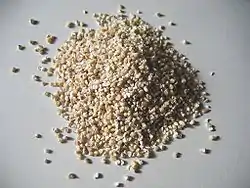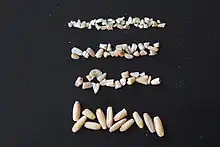Groat (grain)
Groats (or in some cases, "berries") are the hulled kernels of various cereal grains, such as oat, wheat, rye, and barley. Groats are whole grains that include the cereal germ and fiber-rich bran portion of the grain, as well as the endosperm (which is the usual product of milling).
 Barley groats | |
| Type | Whole grain |
|---|---|
| Main ingredients | any grains such as oats, wheat, barley, millet or rye etc. |
| Variations | Bulgur |
Groats can also be produced from pseudocereal seeds such as buckwheat.
Culinary uses
Groats are nutritious but hard to chew, so they are often soaked before cooking. Groats are used in soups and porridges: steel-cut oats are simply sliced oat groats.
Groats of many cereals are the basis of kasha, a porridge-like staple meal of Eastern Europe and Eurasia. In North America kasha or kashi usually refers to roasted buckwheat groats in particular.
In North India, wheat groats are known as dalia and are commonly prepared with milk into a sweet porridge or with vegetables and spices into salty preparations.
Parboiled and cut durum wheat groats, known as bulgur, are an essential ingredient of many Middle Eastern dishes such as mansaf and tabbouleh.
Groats are also used in some sausages, such as black puddings. A traditional dish from the Black Country in England is groaty pudding (not to be confused with groats pudding). Groaty pudding is made from soaked groats, leeks, onions, beef, and beef stock, and baked up to 16 hours; it is a traditional meal on Guy Fawkes Night.[1]
Coarse barley flour is made by milling barley groats.[2]
Production

Bottom: uncut oat groats
The grain is cleaned, sorted by grain, size and peeled (if necessary) before being hulled. Additionally, the grains can be sliced on a "groat cutter", which can be adjusted to cut fine, medium, or coarse groats. Regardless, thereafter the groats are freed from any adhering parts of the shell by a brushing machine. In the case of cut groats, their fragments are sorted according to size by sieving.
Types of groats
- Oat groats (a good source of avenanthramide)
- Millet groats
- Wheat groats, e.g., durum wheat groats, like bulgur
- Buckwheat groats (though buckwheat is a pseudocereal rather than a true cereal)
References
- "Floyd on Britain and Ireland". genome.ch.bbc.co.uk. Retrieved 2020-05-16.
- Ensminger, M. E.; Ensminger, A. H. (1993). Foods & Nutrition Encyclopedia, Two Volume Set. Taylor & Francis. p. 164. ISBN 978-0-8493-8980-1. Retrieved May 30, 2016.
